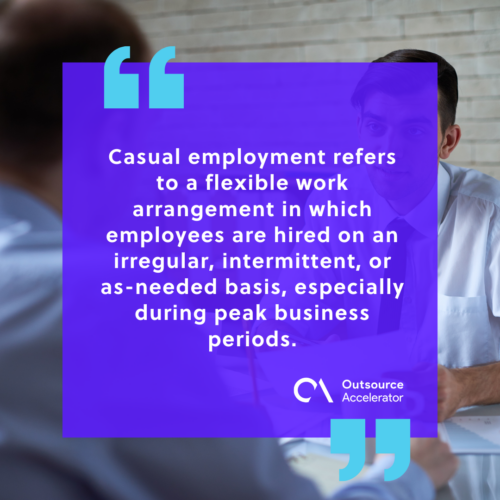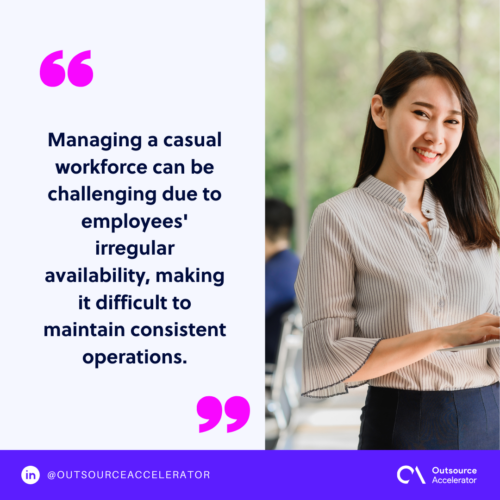Employers’ quick guide to casual employment

Employment arrangements in today’s dynamic workforce take various forms, each tailored to meet the evolving needs of employers and employees alike.
Employment options are diverse, ranging from traditional full-time positions to part-time roles and contractual agreements. These all reflect the growing demand for flexibility and adaptability in the workplace.
Among these work setups, casual employment stands out as a particularly versatile option, offering employers a unique set of advantages and considerations.
This article provides insights into the intricacies of casual employment, exploring its definition, potential challenges, and benefits for effective workforce management.
Casual employment definition
Casual employment refers to a flexible work arrangement in which employees are hired on an irregular, intermittent, or as-needed basis, especially during peak business periods.
In contrast to a traditional work arrangement, casual employment encompasses the following characteristics:
- Irregular hours. Casual employees work on an as-needed basis and do not have set schedules.
- No guaranteed hours. They do not have a guaranteed minimum number of hours per week.
- Flexible arrangements. Casual employment offers flexibility for both employers and employees.
- Short-term engagements. Casual workers are often hired to meet short-term staffing needs or cover temporary absences.
- Limited benefits. Employees on casual employment may not receive the same benefits as permanent employees, such as paid leave or health insurance.
- Termination without notice. Employment can be terminated without notice in some cases.
- Varied workload. Workload may fluctuate depending on business demands or seasonality.
- Higher hourly rates. Casual employees may receive higher hourly rates compared to permanent employees to compensate for the lack of benefits.
Overall, casual work agreements offer employers versatility in managing their workforce. At the same time, they allow individuals to work around other commitments.

Primary benefits of casual employment for employers
Casual employment has been gaining traction as firms are provided with the following advantages:
Flexibility
Casual employment offers businesses greater flexibility in adjusting their workforce to fluctuating demand levels or seasonal variations.
Employers can easily scale their staffing levels up or down based on changing needs without the long-term commitments associated with permanent hires.
Operational continuity
Employing casual workers can help growing companies maintain operational continuity during times of staff shortages, such as when permanent employees are on leave or unavailable.
Casual employees can fill in gaps in the workforce, ensuring that essential tasks are completed without disruption.
Reduced expenses
Casual staff can help businesses minimize overhead costs associated with recruitment, training, and employee benefits.
Since these employees typically do not receive benefits such as health insurance or paid leave, organizations can save on these expenses.
It can also be more cost-effective, especially in industries with unpredictable workloads. Instead of paying salaries and benefits for full-time employees during slow periods, businesses can hire individuals on an as-needed basis, reducing labor costs.
Increased agility
With a casual workforce, businesses can adapt more quickly to changing market conditions or business priorities.
They can quickly hire additional manpower during busy periods or adjust staffing levels to meet evolving customer demands without the constraints of traditional employment arrangements.
Trial periods
Casual employment allows companies to assess the suitability of potential employees before offering them permanent positions.
Employers can evaluate a candidate’s performance, work ethic, and fit within the company culture while they are casual employees, reducing the risk of making hiring mistakes.
Innovation and fresh perspectives
Casual employees bring fresh perspectives and ideas to the workplace, contributing to innovation and creativity within the organization.
Their diverse backgrounds and experiences can enrich team dynamics and inspire new approaches to problem-solving and decision-making.
Potential challenges of casual employment
While casual employment brings in a great deal of pros, firms must also watch out for the following potential pitfalls:
- Inconsistent workforce. Managing a casual workforce can be challenging due to employees’ irregular availability, making it difficult to maintain consistent operations.

- Lack of commitment. Casual employees may not feel as invested in the success of the company compared to permanent employees, leading to lower productivity and engagement levels.
- Limited loyalty and retention. Casual employment arrangements can result in lower levels of loyalty and retention among workers, increasing the need for ongoing recruitment efforts.
- Difficulty in building team cohesion. With a rotating cast of casual workers, it can be challenging to foster a sense of camaraderie and teamwork among employees, potentially impacting overall morale and productivity.
- Uncertainty in workforce planning. The unpredictable nature of casual employment makes it challenging for employers to effectively plan and forecast staffing needs, leading to potential gaps or surpluses in workforce availability.
By identifying and understanding these obstacles, businesses can develop strategies to minimize their impact and optimize the benefits of this employment arrangement.
Embracing casual employment for a dynamic workforce
Casual employment offers businesses a valuable opportunity to adapt to the ever-changing workforce needs and operational demands.
With careful planning and proactive management practices, employers can optimize their casual employment arrangements to drive productivity, innovation, and success in their organizations.







 Independent
Independent




